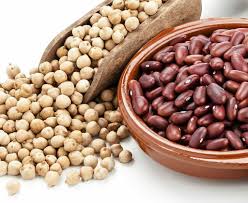Physical Address
304 North Cardinal St.
Dorchester Center, MA 02124
Physical Address
304 North Cardinal St.
Dorchester Center, MA 02124
Eating two types of beans often found in curries reduces the risk of a heart attack or stroke, according to new research

Scientific research reveals that eating chickpeas and black beans regularly can significantly improve heart health and metabolic function. The findings demonstrate that garbanzo beans (chickpeas) help optimize cholesterol profiles, while black beans effectively combat inflammation.
According to the research team, adding these legumes to everyday meals represents an affordable and straightforward approach to lowering chronic disease risk. The scientists noted that substituting beans—whether purchased canned, dried, or frozen—for less nutritious food choices provides an accessible starting point for dietary improvement.
The 12-week investigation conducted in the United States involved 72 participants diagnosed with prediabetes, a condition characterized by elevated blood glucose levels beyond normal ranges. Results revealed a connection between regular chickpea intake and enhanced cholesterol management, while consistent black bean consumption correlated with decreased inflammatory markers.
Co-researcher Morganne Smith explained the significance: “People with prediabetes frequently experience disrupted fat processing and persistent mild inflammation, factors that can lead to cardiovascular disease and full-blown type 2 diabetes. Our research demonstrated that regular bean intake substantially improved cholesterol profiles and reduced inflammatory responses in prediabetic individuals, though blood sugar levels remained unchanged.”
This investigation formed part of a broader research initiative examining how black bean and chickpea consumption influences inflammation and insulin function through changes in gut bacteria composition.
Smith, who is pursuing her doctorate at Illinois Institute of Technology, emphasized the broader implications: “While our research focused on adults with prediabetes, beans offer excellent nutritional benefits for all individuals. These results could help shape dietary recommendations, guide healthcare providers, or support public health initiatives aimed at preventing cardiovascular disease and diabetes.”

The scientists designed their investigation to reflect real-world eating patterns by allowing participants to maintain their normal daily routines while incorporating the study foods. Over the 12-week period, volunteers were randomly divided into three groups: one consuming a daily cup of black beans, another eating chickpeas, and a control group having rice.
The research team collected blood samples at three intervals—baseline, six weeks, and study completion—to monitor changes in cholesterol levels, inflammatory markers, and glucose control. Additionally, participants underwent glucose tolerance assessments at both the beginning and end of the trial.
Results showed remarkable improvements in the chickpea group, where average total cholesterol levels dropped substantially from 200.4 mg/dL initially to 185.8 mg/dL by week 12—a statistically significant reduction.
Among black bean consumers, researchers observed a notable decline in interleukin-6, a key inflammatory protein. This marker fell from an initial average of 2.57 pg/mL to 1.88 pg/mL after three months, representing a meaningful decrease in systemic inflammation.
However, the study found no notable improvements in blood sugar processing across any of the groups.
TO READ MORE, OPEN THE LINK BELOW:
https://www.emporiagazette.com/lifestyles/health/article_ede16760-6c30-5293-b3a5-2ac0a9fb5333.html